“Paradise Lost”
Written by Ronald D. Moore and Ira Steven Behr & Robert Hewitt Wolfe
Directed by Reza Badiyi
Season 4, Episode 11
Production episode 40514-484
Original air date: January 8, 1996
Stardate: unknown
Station log: After a summary of “Homefront,” we see Sisko and Odo going over the reports on the sabotage of the power grid. Odo notes that Red Squad was sent back to the Academy after the blackout. Since they’re cadets, it makes sense that they’d be sent home for protection—but then Sisko notes an order to mobilize all cadets as part of the effort to secure Earth.
Joseph reopens the restaurant after four days. There’s been no sign of attack by the Dominion, and he’s tired of sitting around. Besides, the Starfleet security guards on the streets probably haven’t had a good meal in four days, and Joseph is just the man to feed them…
Sisko contacts the Academy about the recall of Red Squad, and the commandant urges Sisko to erase the record immediately. The commandant also said he was reluctant to let Leyton use Red Squad, but they performed their mission admirably. Sisko plays along, saying he’ll take care of it, but after he signs off, he and Odo (who was deliberately standing off camera, as it were) realize that there’s more going on here than they suspected.
Later at the restaurant, Joseph happily submits to a blood screening—his change of heart, he says, is directly related to the Dominion sabotaging the power grid on Earth. Sisko is now feeling odd about that, and he meets with Nog at their table to discuss Red Squad. Nog says that Red Squad are the only people he’s seen who aren’t scared of the Dominion. He’s been taking Jake’s advice to get to know them, though they seem only to be interested in Nog because he knows Sisko—Sisko is their hero, apparently.
Sisko orders Nog to arrange a meeting with a member of Red Squad. Nog’s reluctant at first—the members of Red Squad are supposed to be secret, and Nog only found out thanks to Ferengi deviousness—but Sisko makes it an order and soon Sisko is talking with Cadet Riley Aldrin Shepard. On the guise of a dress-down by a superior officer, Sisko gets the whole story of how Red Squad sabotaged the power grid themselves. It was supposed to be completely off book, with no written record of the mission. The briefing officer didn’t even identify herself.
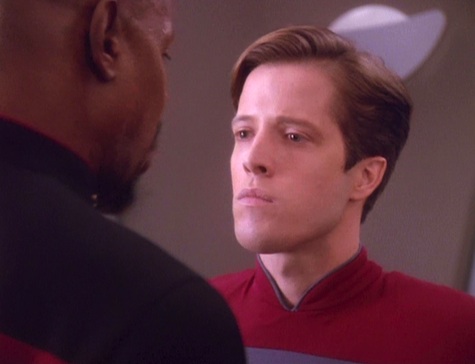
Sisko and Odo discuss the matter in Sisko’s Creole Kitchen. There hasn’t been a Dominion invasion, but Starfleet has been able to fortify Earth—the very thing Leyton wanted. The evidence points to Starfleet sabotaging the power grid for their own purposes. Sisko is on the horns of a dilemma—these are his friends, and he can’t turn against them. Odo points out that it is they who have turned against him.
The next day, Odo and Sisko report to Jaresh-Inyo. Odo starts with his learning from the Krajensky changeling that the Founders were infiltrating the Federation, and how after that, Leyton started pushing for tighter security on Earth, but Jaresh-Inyo rejected the proposal. After the Antwerp bombing, Jaresh-Inyo did agree to some security measures, but not all of them. Leyton and his people wanted all of it, so they sabotaged the power grid.
Jaresh-Inyo is appalled at the notion, and Sisko doesn’t have any real proof, as Red Squad and Leyton covered their tracks. So Sisko suggests that the president order Leyton to remove the troops and stop the random blood screenings. If he acquiesces, Sisko is wrong, and he’ll resign; if he’s right, this will prove it. However, the security measures are overwhelmingly popular among the people; the president can’t discontinue them without proof, so Odo and Sisko must get that proof.
Sisko tries to get Nog to arrange another meeting with Shepard, but instead of Shepard—who, along with Red Squad, has been sent offworld—he gets Leyton. They sit and talk in the restaurant. Leyton feels what he’s doing is necessary to protect Earth. Sisko won’t support Leyton, so the admiral ends his tenure as head of Starfleet Security and sends him back to Deep Space 9.
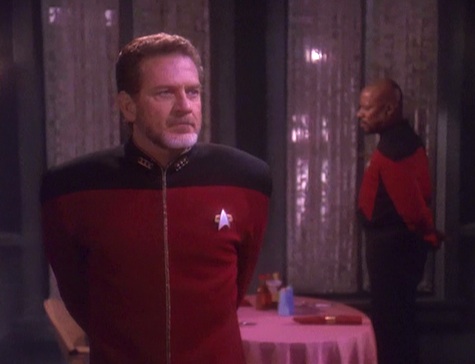
While Sisko sits pensively at a fountain, he’s confronted by a changeling disguised as O’Brien, who taunts him for a bit. Then he sits pensively in the restaurant, and has a talk with Joseph. They reminisce about his old girlfriends, and Sisko finally decides to take action. He contacts Kira on a Bajoran frequency in order to remain covert (she informs him that the wormhole stopped opening and closing since Sisko transferred to Earth) and then he and Odo break into secure Starfleet files (which Odo manages, saying he learned how to do it from watching Quark all these years) and discover that Leyton’s been putting officers who served under him in sensitive positions on or near Earth. Many of these transfers are scheduled for the 14th, when the president is to make a big speech.
Benteen comes upon him in his office, and he says he’s just cleaning stuff out before he leaves. Sisko congratulates her on her promotion to captain of the Lakota, and he tells her that he’s staying on Earth for a bit longer, using some of his leave.
When Sisko reports to the president with his findings, Leyton and Benteen are already there, and they fake a failed blood screening “proving” that Sisko is a changeling. Leyton visits Sisko in his holding cell, and admits that he plans to have Starfleet take over control of Earth on the 14th. Leyton insists it’s temporary until the changeling threat is eliminated.
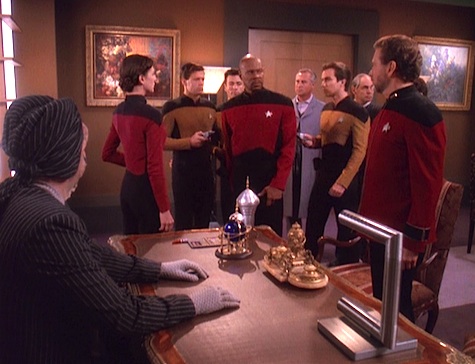
Several days later, Odo breaks Sisko out of his cell, telling him that the Defiant is en route, complete with the officer who set up the opening and closing of the wormhole, who did so under Leyton’s orders. Odo goes to speak to the president while Sisko confronts Leyton with his evidence. However, Leyton has already ordered the Lakota to intercept the Defiant, having been told that everyone on the ship is a shapeshifter.
Sisko points out the long-term consequences of his actions. Other Federation worlds won’t necessarily agree with Leyton ousting their duly elected president. It could lead to civil war, one that will start if the Lakota opens fire on the Defiant.
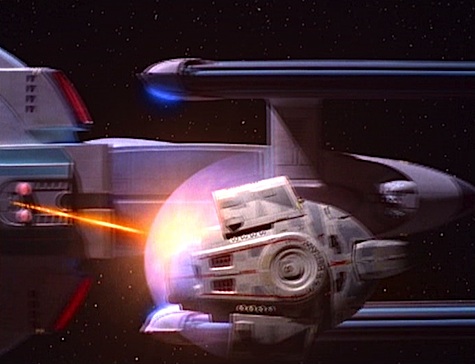
Meanwhile, the Lakota opens fire on the Defiant. Worf does hesitate at first—it is a fellow Starfleet vessel—but ultimately he chooses, unsurprisingly, to fight back. Benteen contacts Leyton saying the battle isn’t going well for them, and Leyton orders her to keep the Defiant from reaching Earth by any means necessary. Tellingly, when Benteen asks for confirmation that orders have been changed from disabling the Defiant to destroying it, Leyton won’t actually come out and say that.
Worf contacts Sisko a bit later to announce that the Lakota has powered down weapons and is escorting the Defiant to Earth—however there have been more than two dozen casualties (most of them on the Lakota). Sisko says that the president is expecting them.
Leyton insists that he still has enough officers loyal to him to make a fight of it, but Sisko points out a) that Benteen is the one most loyal to him, and he’s lost her, and b) who is he going to fight, exactly? “You’re fighting the wrong war.” Leyton realizes he’s lost and resigns.
The Siskos and Odo say their goodbyes to Joseph and beam to the Defiant, and then Joseph opens the restaurant. “Today I’m recommending the pasta boudine. It’s got a bit of a kick, but it’ll make you smile.”
Can’t we just reverse the polarity? The opening and closing of the wormhole that made everyone suspicious of Dominion activity in the first place was actually a subspace doodad being placed on the communications relay on the Gamma Quadrant side of the wormhole in order to fake a cloaked fleet coming through.
The Sisko is of Bajor: Sisko is forced to take down his former CO, who didn’t bring Sisko in on his plan. Leyton’s conspiracy includes at least Benteen and the Academy commandant, and there are others involved, but even though Sisko was high up in Leyton’s chain of command on Earth, he was deliberately left out of the conspiracy to sabotage the power grid. Leyton himself confirms that he wasn’t sure Sisko would go along with it, but the commandant of the Academy and the dude from Red Squad both just assumed that Sisko was in on it.
Don’t ask my opinion next time: When the battle between the Defiant and the Lakota gets down to the nitty-gritty, it’s Kira who reminds Worf that it’s “them or us.”
The slug in your belly: Dax does some nifty maneuvering of the Defiant, doing spiffy barrel rolls around the Lakota as they fight.
There is no honor in being pummeled: Worf is in charge of the Defiant, and he puts off firing on the Lakota as long as he can, but when push comes to shove, he says, “We fight.” Damage to the Defiant is much less than the considerable damage done to the Lakota, though Worf resists taking the final step to destroying them.
Preservation of mass and energy is for wimps: Odo has a relatively easy time breaking Sisko out of jail, seeing as how he helped Sisko write the security protocols for Starfleet Headquarters on Earth, where he’s being imprisoned. Odo has also apparently at some point learned the Vulcan neck-pinch, which he uses on one of the security guards.
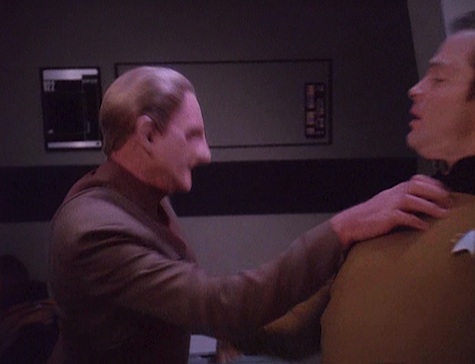
Rules of Acquisition: Nog is able to find out who’s in Red Squad because he’s a Ferengi—which is the only actual reason he offers, and it’s really all we need. He’s gonna make such an entertaining officer…
Victory is life: A changeling disguised as O’Brien has a little chat with Sisko, announcing that there are only four changelings on Earth. Though it’s honestly three more than they need…
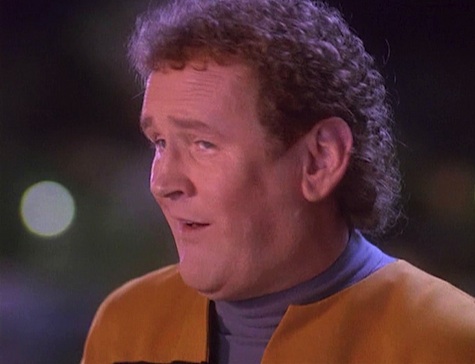
Keep your ears open: “Paradise has never seemed so well-armed.”
Sisko giving Benteen the episode’s theme in ten words or less.
Welcome aboard: Back from “Homefront” are Brock Peters as Joseph, Aron Eisenberg as Nog, Susan Gibney as Benteen, Robert Foxworth as Leyton, and Herschel Sparber as Jaresh-Inyo. We also get David Drew Gallagher as Cadet Shepard; he’ll reprise that role in “Valiant” in the sixth season.
Trivial matters: Robert Foxworth had previously played a high-ranking military officer staging a coup against Earth on Babylon 5, though in that case, his General Hague was on the side of the good guys. However, he was unable to reprise his role as Hague in the episode “Severed Dreams” due to his commitment to this two-parter, and so Hague was killed off-camera, as stated by Major Ed Ryan, played by Bruce McGill. There’s a blooper in that episode, in which McGill had Ryan reply to the query as to where Hague was thusly: “General Hague is doing Deep Space Nine. It seems his agent double-booked him, and there was nothing to be done. You’ll have to settle for me.”
This two-parter was heavily inspired by the film Seven Days in May, and this episode obviously takes its title from the epic poem by John Milton.
All the former officers from the Okinawa whom Sisko mentions in passing are named after characters from Joseph Heller’s novel Catch-22.
Leyton mentions that the Okinawa fought against the Tzenkethi, last mentioned in “The Adversary,” when Leyton was CO and Sisko was XO. One of those battles was dramatized in the novel Rough Beasts of Empire by David R. George III.
It will be revealed in “When It Rains…” in the seventh season that, during this trip to Earth, Odo has been infected by a morphogenic virus, which Odo will infect the Founders with when he enters the Great Link in “Broken Link” at the end of this season. That disease will ravage the Founders throughout the Dominion War arc of the final season.
The Slings and Arrows eBook The Oppressor’s Wrong by Phaedra M. Weldon tells what the Enterprise-E was doing during the coup, on a mission to Starbase 375 when martial law is declared.
In the novel Hollow Men by Una McCormack, Sisko visits Leyton in prison after the events of “In the Pale Moonlight,” in which Sisko will commit acts that compare unfavorably to those of Leyton in this two-parter.
In addition to previously playing the virtual and real Leah Brahms in “Booby Trap” and “Galaxy’s Child” on TNG, Susan Gibney was a finalist for the role of Captain Janeway on Voyager.
Red Squad will be seen again in “Valiant,” as well as the novel The Best and the Brightest by Susan Wright, the aforementioned The Oppressor’s Wrong, and the videogame Invasion.
Various novels—notably A Time to Kill and A Time to Heal by David Mack and your humble rewatcher’s A Time for War, a Time for Peace and Articles of the Federation—will establish that Jaresh-Inyo stood for election later in the same calendar year as this two-parter, and lost badly, due mainly to being duped by Starfleet. His replacement is a Bolian named Min Zife, who is more of a hardliner, and he’s the one who leads the Federation through the Dominion War. Articles, which takes place eight years after this two-parter, includes Jaresh-Inyo’s funeral and the president—Zife’s successor, Nan Bacco—gives his eulogy.
Walk with the Prophets: “This Pandora’s Box of yours—we’re opening it together.” A limp, weak ending to a promising storyline, one that pretty much throws all the pertinent questions of “Homefront” out the window in exchange for a fairly rote power-grab storyline.
Robert Foxworth is a problematic casting choice here, because, while he’s excellent at quiet intensity (see in particular his performance as the eponymous character in Gene Roddenberry’s The Questor Tapes, a character that was in many ways the rough draft for TNG’s Data), he’s less good when the intensity gets kicked up a notch. As a behind the scenes threat in the early parts of the episode he’s a lot more effective than he is after he steps out from behind the curtain in Sisko’s Creole Kitchen to confront his former XO. As a result, Leyton has no nuance, he’s just a nasty-ass, run-of-the-mill, power-mad bad guy.
And that’s too bad, because the role really calls for nuance. The story would’ve been so much more effective if Leyton had the strength of his convictions, if we saw him the way Sisko described him to Jaresh-Inyo—a patriot who believes he’s doing the right thing—but instead we get a mustache-twirling villain who imprisons Sisko and orders Benteen to fire on the Defiant.
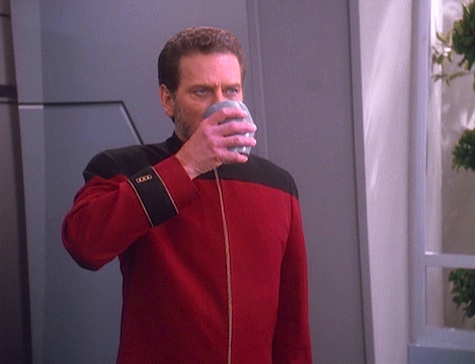
Both of those actions, by the way, don’t make any sense on the face of it. If Sisko was a changeling, why didn’t he turn into a bird and fly out of Jaresh-Inyo’s office? He was also imprisoned for several days, which means that he had to have eaten, slept, and gone to the bathroom, none of which are things changelings need to do. (Hell, the first time he took a dump, he’d be “revealed” not to be a changeling, since, to be indelicate, shit screenings would work as well as blood screenings.)
And Leyton hangs Benteen out to dry by not actually giving the order to destroy the Defiant, but using the language of plausible deniability, enabling him to later say, “Why, no, Councillor, I never told Captain Benteen to destroy the Defiant, she did that on her own initiative.” It’s to Benteen’s credit that she figured it out and ended the fight; it’s to the script’s lack of credit that we don’t see that. I would much rather have seen Worf and Benteen’s conversation on the subject, rather than yet another talk between Leyton and Sisko, of which we had about ninety in the episode, each one less interesting than the last. It wasn’t aided by Avery Brooks being all histrionic when Sisko castigates Leyton, as it’s Brooks’s least convincing mode.
Plus, there’s the problem that Sisko himself throws in Leyton’s face: how’s the rest of the Federation (150 worlds or so, as we learn in First Contact) going to feel about this? His plan doesn’t really take that into account, and the solution he proposes to Sisko is poorly thought through.
Worse, we get a weak followup to Joseph’s very legitimate complaints about the blood screenings from “Homefront.” Last time, he was adamant that he shouldn’t—but once the power grid goes down, then it’s okay. Here’s a prime candidate for the examination of situational ethics—where is the line here, anyhow?—and it goes completely unaddressed, even though at this point Sisko knows that the sabotage of the power grid may well not have been by the Dominion, making Joseph’s change of heart very hollow.
Also the notion of Leyton as a changeling is never addressed. That’s part of the point, of course, is that the Founders are fomenting paranoia and that humans are doing this all themselves, but it still should’ve come up, if for no other reason than to disappoint Sisko, given him the one hope that maybe his old friend was actually a changeling—but instead was the ugly face of humanity.
Warp factor rating: 6
Keith R.A. DeCandido will be co-running a writers workshop sponsored by the I-Con convention this Saturday, the 8th of March, in downtown Manhattan, alongside fellow author Laura Anne Gilman and writing professor Joan Digby. Click here for more info.










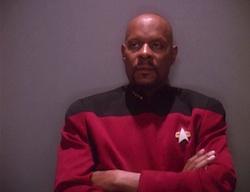
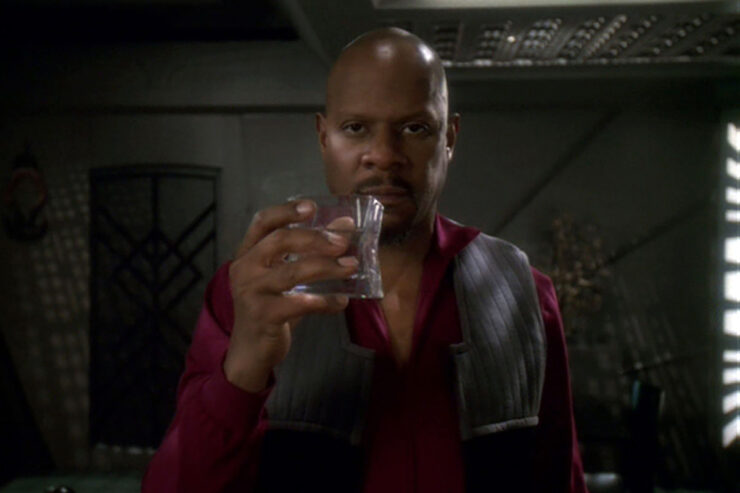
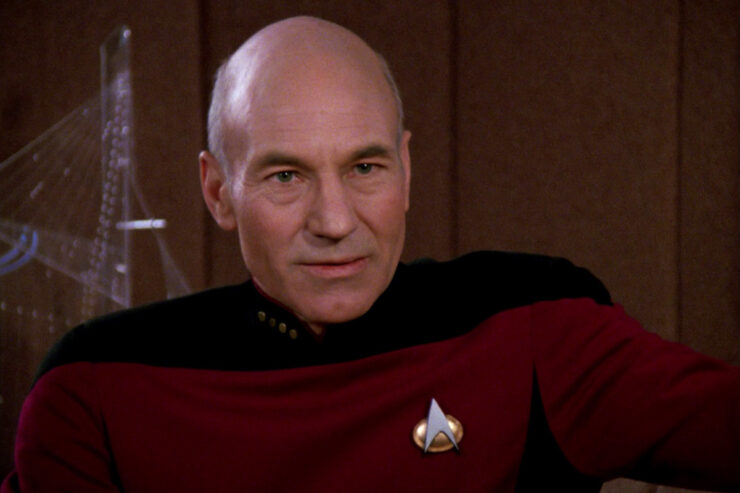
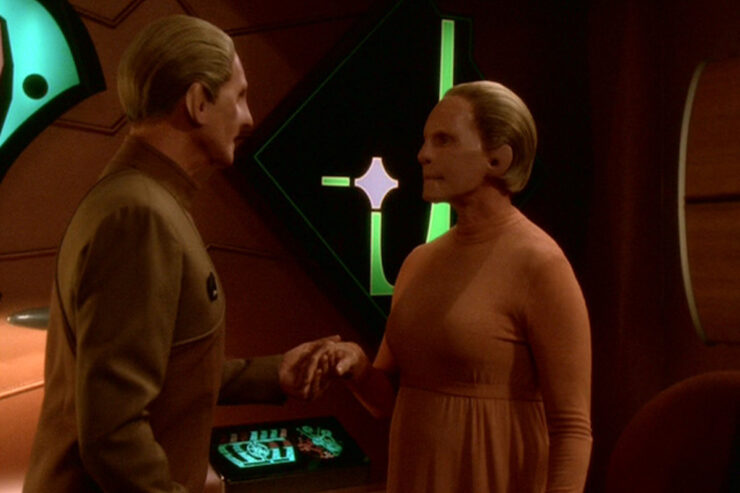
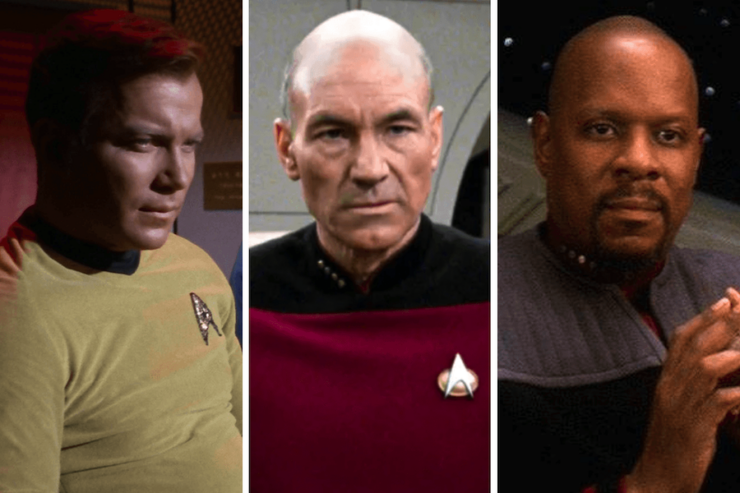
Krad, I now want to write a DS9 parody where the Starfleet officers do shit screenings to check for changelings.
I like Brooks’ acting here; his speech to Benteen about killing 50 Starfleet officers is one of the most memorable parts of the episode here. That’s actually the reason I thought she stood down. She was the one onboard who knew there were no changelings and knew destroying them was wrong, not because of some convoluted head game that Leyton never confirmed destroying the Defiant so that means he would blame her for it.
Sisko lied to non-Federation citizens in order to advance the Federations foreign policy agenda. Leyton committed high treason. Are you sure Leyton comes out of this looking best?
Incidently, am I correct in thinking that the only time we see an attempt to change the government of the utopian Federation on-screen, it turns out to be a military coup? And no civilian authority has any influence on events at all – it all happens within Starfleet.
I’ve always thought that the depiction of the Federation on TV makes much more sense if you assume it is a Communist military junta…
I’m surprised there was no “Tough Little Ship” section, at least about how the Defiant was equipped with ablavite armor without informing Starfleet Operations.
Well then – it looks like the recipe to Star Trek Into Darkness was really a hefty dollop of Wrath of Khan with bits this episode mixed in. Unfortunately in this case, when you mix leftovers, what at you get at the end is not very tasty.
I always found it very forced that a changeling would just appear out of nowhere and have a chat with Captain Baldy II for no real reason. What was the point?
Also what chance did one regular federation ship have of destroying the federation’s only actual warship. It’s not merely a ‘tough little ship’ it’s a complete beast.
@Ad
Sisko covered up the murder of two non-Federation citizens, one a highly-ranked Romulan Star Empire politician, to have the Romulans declare war on false pretext.
Also, I guess neither Admiral Cartright’s cabal or the aliens in Conspiracy actually attempted to change the Federation’s government, so yes, I guess this is the only case.
Bit of a spoiler there in the Trivial Matters section.
I agree that they do a rather poor job of showing Leyton’s motivations to be a misplaced sense of patriotism (with a healthy dollop of terra-centric thinking, something Trek has always been plagued with). It would have been easy enough to give him a “the village had to be destroyed to save it” speech, but maybe the writers and producers were just old enough for that sort of thinking to be a matter of course for someone like Leyton.
Along with what ad says @2 regarding the differences between Leyton here and Sisko in “In the Pale Moonlight”, there is also the fact that Sisko agonizes over what he does (and he is largely maneuvered into that position as well) and is clearly troubled by it even after the fact, while Leyton seems just fine and dandy with what he’s doing and doesn’t even seem to care about ordering the deaths of a large number of Starfleet personnel. Sisko comes of a lot better, in my opinion.
Finally, while having some doubt about Leyton’s status as a possible Changeling would have made sense, they already went to that well in “Homecoming”. It would have been a little redundant here.
DemetriosX: This is a REwatch of DS9, and that means I’m going to talk about stuff in future episodes. I refuse to acknowledge that I’ve “spoiled” something that first aired 20 years ago.
—Keith R.A. DeCandido
@2: “I’ve always thought that the depiction of the Federation on TV makes much more sense if you assume it is a Communist military junta…”
A lot of people come away from Trek with the assumption that the Federation is a military state, but that’s because they’ve only seen it through the perspective of shows about Starfleet. If you only knew about the United States from shows like JAG, Black Sheep Squadron, and M*A*S*H, you might come away thinking it was a military dictatorship too.
Unfortunately, sometimes the writers do fall prey to the same selection bias and don’t differentiate between Starfleet and the civilian government as much as they should. Which is why we get lines like the 2009 movie’s “The Federation is… a peacekeeping and humanitarian armada.”
@3: It’s “ablative” armor, i.e. armor that ablates (erodes/wears away to dissipate the energy from weapon impacts), not “ablavite.”
Was Susan Gibney meant to reprise her role as Benteen in Voyager (if chosen) or be given yet another new character?
I think you can easily infer that Earth is most likely an introspective society that models paradise. In the movies and even the shows you have admirals going crazy and doing stupid things because of greed that seems shocking to our heroes, so it is very unusual. DS9 though spits on this a bit, the Federation, not Starfleet wrote off the Maqui and arrested them instead of helping them, so introspective to the point of apathy.
I actually liked this one a bit better than that, and maybe I just filled in my own assumptions about Leyton thinking he was doing the right thing – you’re right, when you look at it, he does become rather over the top and make a bit of a leap. And I kind of liked the irony that Joseph was going along with the blood test, knowing that it was for a fabricated reason – the fear was taking hold.
Oh, and for the record, I’ve seen ‘Into the Pale Moonlight’, and I think what Sisko did is a bit worse, but that’s just me. Even though both Sisko and Leyton had good intentions, I think there’s some difference between increasing security measures (although maybe he also was wanting personal power…) and dragging another entity into an all out war under false pretext. Maybe I’ll feel differently when we get there and have more of the context, though. I don’t remember all the details of that episode, to be honest.
Anyway, happy Mardi Gras! :) Wonder if they still celebrate Mardi Gras at Sisko’s in the 24th century!
@8 krad
I’m not sure the DS9 spoilers were the issue for DemetriosX. The Babylon 5 spoiler, on the other hand, might be a bit of a concern.
@2 @9 I don’t know what the usual practice on linking to outside speculative analyses is, but this episode reminded me of a longread piece I read a few weeks back (https://medium.com/editors-picks/29bab88d50) discussing the 24th-century Federation as an example of where we could be headed as a post-scarcity economy, and actually using a lot of DS9 data points — including Sisko’s restaurant as seen here! (It’s actually an interesting read on the question of balancing private ownership in an economy that keeps stating that it’s beyond money, explaining why the Federation is NOT communist)
Back to the episode at hand, I wonder how much of the disappointment at Part II vs Part I is due to the nascency of longform storytelling here. While the Dominion plot is ongoing, the war itself hasn’t begun, and the writers haven’t cemented themselves into place yet where they can’t change tack if needed back to a more episodic format. Likewise, the sort of widescale changes to the universe that we’d see in later seasons haven’t been really introduced to the Trek vocabulary yet — and certainly wouldn’t be done to Earth & the Federation (notice how, come ENTERPRISE, they *would* be willing to do such a thing, given how the nature of serial storytelling had shifted). As much as DS9 was past the “this looks like a TNG episode” phase, there was still some of that “reset at the end” natural to nineties television remaining at that point for non-cliffhanger episodes.
(Things NOT reseting to status quo for eps like “In the Pale Moonlight” or “Inta Arma Status Legit” made them THAT much more gut-wrenching…)
So little has been actually stated in any of the Trek series about a civilian government in the Federation polity that there is no reason to assume that it is not a military government. it’s easy to make the argument that the Federation President is simply a figurehead similar to the King in Spain under Franco.
Contrast that with Babylon 5 that makes explicit that there is a government separate from the military. Mind you that it may well be a corrupt, weak government but it’s none-the-less present. Trek as a given just doesn’t handle the matter of governance well ‘tall.
My biggest problem is with the choice of Foxworth to play Leyton – a lot of his characters are “wolf in sheeps clothing” type – so much so, that when I saw him, I knew he was a/the villain of the piece. And you watch enough TV, that happens a lot – you see certain people in certain roles, you already know what’s coming.
Quoth Nicholas: “So little has been actually stated in any of the Trek series about a civilian government in the Federation polity that there is no reason to assume that it is not a military government. it’s easy to make the argument that the Federation President is simply a figurehead similar to the King in Spain under Franco.”
There are, in fact, numerous references to the Federation president and the Federation Council in numerous episodes of all the TV shows, but the biggest evidence against your hypothesis is this very two-parter. The plot only works if the president isn’t a figurehead. If Starfleet is really in control, there’s no need for Leyton to go through all these shenanigans, nor for him to resign at the end.
Quoth Lerris: “I’m not sure the DS9 spoilers were the issue for DemetriosX. The Babylon 5 spoiler, on the other hand, might be a bit of a concern.”
My argument about B5 is pretty much exactly the same. The show aired 20 years ago.
Quoth ValMar: “Was Susan Gibney meant to reprise her role as Benteen in Voyager (if chosen) or be given yet another new character?”
Kinda impossible, since by this time Voyager had already been on the air for a year and a half. :)
—Keith R.A. DeCandido
oops… In my defence, I haven’t seen any ST as it was being originally aired, except for half a dozen or so STV episodes in 2000. Their order in my head isn’t instinctive and I was overcome by “what if” thoughts regarding Benteen vs Janeway ;)
@15: “So little has been actually stated in any of the Trek series about a civilian government in the Federation polity that there is no reason to assume that it is not a military government.”
No, there is every reason to assume that, because a military government would be a fascist dystopia and that’s anathema to Star Trek‘s optimistic vision of the future. Frankly I’m astonished that anyone would ever contemplate the possibility that a series as utopian as ST could ever depict the military as being anything but subordinate to civilian authority. Especially since Starfleet, prior to DS9’s Dominion War arc, was usually portrayed as a somewhat pseudomilitary organization, more like the Coast Guard crossed with NASA than anything else. Picard even claimed outright in “Peak Performance” that Starfleet was not a military, although that’s clearly untrue from an organizational standpoint. Even though Roddenberry himself was a military veteran, by the time of TNG he evidently preferred to downplay the military aspects of Starfleet and paint it more as a research organization.
@16: Conversely, my image of Robert Foxworth was shaped early in life by his heroic role in The Questor Tapes — and as mentioned before, he’d played a heroic leader on Babylon 5 not long before this. So if anything, I would’ve been predisposed to see Foxworth as a good guy.
The Federation is ruled by the military—but not in this universe. Always check for goatees.
On Vulcans, that is.
Sorry, Sisko.
@20: That’s the Terran Empire. And as the name suggests, it’s ruled by an emperor or empress. True, we are aware of instances where ambitious Starfleet officers have either attempted to take the throne for themselves (Jonathan Archer) or succeeded in doing so (Hoshi Sato, Spock), but lots of civilian leaders in both democracies and monarchies were former military personnel, e.g. Julius Caesar or Dwight Eisenhower.
Uh, yes. I know…
I like both parts; the pair is among my favorite DS9 episodes. The only thing I dislike is Red Squad…when “Valiant” comes around I will *not* be rewatching that one.
@19: I tend to see Starfleet as modeled on the Royal Navy during the “Pax Britannica” from c.1814 – 1914, during which it seldom if ever fired a shot in anger. Rather, it existed as a “fleet in being” as a deterrent to other European powers (British naval doctrine through WWI was to maintain a fleet bigger than the next two largest navies combined), to safeguard trade routes and for scientific exploration (during this period the Royal Navy monopolized British Arctic and Antarctic expeditions). By the late 1880, it was an article of faith that whichever country controlled the sea-lanes would dominate (per Mahan’s THE INFLUENCE OF SEA-POWER UPON HISTORY), so the Royal Navy’s administration by default wielded enormous influence over British government policies. While one would not necessarily describe Imperial Britain as a military-controlled state, the maintenance of a strong navy did effectively direct much of foreign policy and the domestic economy.
@25: That’s a good analogy, but the core point is that it was not a military-controlled state, just a state whose military had a lot of influence abroad. The problem is that all we’ve really seen of the Trek universe is the stuff on the frontier, the places where the military would play an important role. We’ve gotten very few glimpses of everyday civilian life within the Federation itself, except in instances like this one where the Starfleet characters we follow every week have a reason to get involved in it. It’s a simple case of selection bias. If you watch a show about doctors, you’ll see them constantly dealing with sick people, but that doesn’t mean there are no healthy people in the world. It just means you’re seeing the particular cross-section of the world that the featured characters have reason to get involved with.
Man, I forgot all about The Questor Tapes. Or rather, I forgot the title. I only remember enjoying it as some Sunday evening UHF fun when I was a little kid. Thanks!
Man, I forgot all about The Questor Tapes. Or rather, I forgot the title. I only remember enjoying it as some Sunday evening UHF fun when I was a little kid. Thanks!
19. ChristopherLBennett
“No, there is every reason to assume that, because a military government would be a fascist dystopia and that’s anathema to Star Trek‘s optimistic vision of the future. Frankly I’m astonished that anyone would ever contemplate the possibility that a series as utopian as ST could ever depict the military as being anything but subordinate to civilian authority.”
Except that ST does a very bad job of depicting this subordination, both in the series in general, and in this episode in particular. Sisko, for example, is supposed to be working to bring Bajor into the Federation. That is a diplomatic job, and when Sisko is working on it he should be responsible to the Federation agency responsible for running the accession process.
All the officials Sisko reports to about this are wear Starfleet uniform. Obviously, Starfleet must run the accession process.
Likewise, in this two-parter, Sisko is brought to earn to work on its internal security. That would mean working with local law enforcement – the equivalent of the London Metropolitan Police, FBI, MI5 etc. Everyone he works with is in Starfleet uniform. So are all the security people we see in the street. Obviously, Starfleet must run law enforcement as well.
Likewise, when people are talking about the coup, no one worries about – or even mentions – any agency or authority other than Starfleet. Even Star Wars had a general wondering how the Emperor could run the government without the authority of the Senate. No one in “Paradise Lost” thinks about the Federation Council. They don’t even worry about the mass media, which is very unlike most real coups.
The point is: Star Treks writers may think that it is pluralistic, democratic and so on. But that is not what they show on screen. Especially not in this episode. The events of this episode could only occur in a society in which few people seriously believed in the existing governments right to run the country.
@30: Okay, yes, sometimes — often — the writers oversimplify things by having Starfleet seemingly do everything. But it absolutely does not make sense to assume that is their intention, that the default assumption is that the Federation is a dictatorship unless explicitly disproven.
Quoth ad: “The events of this episode could only occur in a society in which few people seriously believed in the existing governments right to run the country.”
Er, no, the events of this episode could only occur in a society in which everyone believed in the existing government’s right to run the country because otherwise there wouldn’t be any need for a military coup.
—Keith R.A. DeCandido
Thought I’d point out the possibility that Cadet Riley Aldrin Shepard has some connection with Alan Shepard and Buzz Aldrin?
If there’s one thing that really hurt this episode was the budget. Having spent a truckload of money on both The Way of the Warrior and Starship Down left the budget really slim at this point in the season.
Paradise Lost really suffered from a watered-down and poorly cut battle sequence. I think the impact would have been greater, had we seen Lakota stuntmen being blown to bits.
The budget was so small, they couldn’t even do all of the CG morphing sequences with Odo, and had to settle for a Vulcan Nerve Pinch (a rare creative moment in a poor ending).
33. Krad
There is always a need for a coup if you want to take over the country, but can’t do it legally.
In principle, one could happen in Washington tomorrow morning. The coup would be needed to put the guy who led it into power. It wouldn’t take that many people to seize the White House. But it won’t happen, because no one would obey the coup leader instead of the President (or if he is killed, the VP and the rest of the chain of command).
A coup has a chance of success only if people can’t tell or don’t care if the coup leader has a better claim to power than the guy who gets overthrown.
It is like that Mirror Universe episode of Enterprise, when Archer remarks that Starfleet is loyal to the Emperor – they just don’t particularly care who he is. That is the kind of regime that risks a coup. If Leyton did not think the Federation works like that – how could he hope to succeed?
@33: You’re missing Keith’s point. Leyton’s scheme tricked the civilian president into granting Starfleet emergency powers that it did not already have, so that Leyton could then institute martial law and put Starfleet in charge of the government. He wouldn’t have had to do that if Starfleet were already in charge of the government. If you think this was about one Starfleet officer unseating his Starfleet superiors, then you’ve completely forgotten what actually happened in the episode and you need to watch it again.
@19
The whole Coast Guard / NASA crossover aspect brings up an interesting analysis of how Roddenberry himself viewed Star Trek.
The way I see it, Roddenberry is probably the kind of person who would have strongly opposed the ongoing militarism of the Reagan administration in the 1980’s.
This would create an interesting parallel with Roddenberry himself, as he viewed the Trek movies going further towards a more militaristic approach (even though Wrath of Khan wasn’t that military, to begin with), and he ended up developing Next Generation as the antithesis of that Reagan-esque tendency, redefining how Starfleet and the Federation related to one another.
I will agree that the performances in this episode weakened it a bit, and all the Sisko+Leyton dialogue could have been replaced with some more interesting things, but I would still rate it at least a 7, maybe 7.5 if we’re allowing decimals, for one reason.
The core of this episode is to show exactly what the Changelings are trying to do — and succeeding at doing. Formenting chaos. We get to see plenty of it from the outside, particularly with the Klingons but also with the Romulans and Cardassians, but this one episode is all about what happens to US when the Changelings do their thing. What that kind of internal strife looks like internally. Good men and women set against each other, conflict between people who are on the same side but too dead-set on their own ‘what needs to be done’ to see it.
In that respect, this episode is actually a fairly solid success. So to use the parlance of US schools, I wouldn’t give it less than a C grade.
@36 He would still have needed to do it to put LEYTON in charge of the government!
But even if the President himself is not a serving officer in Starfleet, everyone around him, and every power base in the goverment, seems to be in Starfleet. The Federation would appear to be a civilian regime in the sense the Pakistan is. Which is to say – it is dominated by the military, but there is a civilian head of state. So long as he does what they think he should do.
@39: It’s not about Leyton! It’s about what this episode explicitly establishes to have been the case before Leyton’s coup attempt. Here’s the key dialogue from this very episode:
That alone proves that Starfleet does not already have direct control over the government. Your interpretation is absurd and based on cherrypicking the evidence to support your preconceptions.
Also, we haven’t seen the government do anything except supervise Starfleet. Investigations into the mob are handles by Starfleet. Also, search and rescue, emergency medical services, building ships, transporting scientists and helping them to do experiments, biological and geological surveys – Starfleet does everything. In TNG, we see some civilian ambassadors, but in DS9 even diplomatic negotiations are handled by Starfleet
@41: Again, though, that’s selection bias because the shows we’re watching are about Starfleet officers. So naturally the events we see are the ones that Starfleet gets involved with. If you watch a show that’s explicitly about Starfleet, then of course everything you see happening is going to involve Starfleet, just as everything on House involves medicine and everything on Law & Order involves crime. It doesn’t mean the whole universe is like that, it just means that’s what the shows concentrate on.
And yes, Starfleet is more than just the military. It’s the Federation’s primary organ for space exploration, so naturally it’s at the vanguard of diplomacy and is used for colonial support and “maritime” rescue. As mentioned before, the template is the Royal Navy during the “Pax Brittanica.” But that’s what’s going on out on the frontier. It doesn’t show us what everyday life on Federation member worlds is like.
@42
But we do see people other than Starfleet officers in DS9. We see Bajoran religious leaders, Cardassian politicians, Ferengi businessmen, Romulan Senators and so on. Its just the Federation where everyone of importance is in Starfleet.
You mentioned the 19th century Royal Navy. But a story about a political crisis in 19th century London would certainly NOT have been all about the Navy. There would certainly have been a big input from the Church, the Press, the Queen, the Cabinet and, above all, Parliament itself. And hunts for spies and suchlike would have been handled largely by the Metropolitan Police.
Likewise the fleet based at, say, Malta, was subordinate to the supreme British official in the Med- which was usually the Ambassador to Constantinople. Malta itself had its own elected council, its own political parties, and was swarming with British traders and merchantmen. There is a similar degree of pluralism on Babylon 5, but not on DS9.
@43: “But we do see people other than Starfleet officers in DS9. We see Bajoran religious leaders, Cardassian politicians, Ferengi businessmen, Romulan Senators and so on. Its just the Federation where everyone of importance is in Starfleet.”
No, you’re still mistaking a biased selection for a representative sample. We hardly see everyday life in the Federation, because the show focuses on Starfleet. You didn’t see many American civilians on M*A*S*H, but that doesn’t mean everyone in the 1950s US had been drafted into the military or that the Army ran the country. It just meant that the show focused on military personnel abroad and thus did not offer a representative sample of what Americans’ lives were like.
I would have rated this a bit higher than you, krad. I would have given it a 7 or 8. All the elements of a political thriller are here; it was more the bad acting on the part of Avery Brooks that brought it down.
I do agree Brooks is fairly inept at playing angry, histrionic roles. He is too over-the-the-top and it does not seem very convincing. My drama teacher in high school always said variability in tone and intensity are the keys to good acting.
When every word uttered by an actor in a scene is intense, the overall effect is nothing is because there is nothing to contrast it to.
@25 The Royal Navy fired plenty of shots, from 1814-1914, it was just never seriously challenged. I give you Algiers, the Ottoman Empire, the Crimean War, the Opium wars, etc.
There is a difference in never being seriously challenged and “not firing a shot.”
ad: Give it up, your interpretation is silly and goes against the basic premise of Star Trek; your argument makes you look as if you have either never watched the show, completely misunderstand what you are seeing if you have watched it or haven’t listened to anything anyone has ever said about Starfleet and or the Federation on the show. Perhaps it is a combination of all three, I don’t know, but your comments read like you are arguing that the earth is flat. The characters on the show have consistently made it very clear that Starfleet is an organization that answers to a civilian government; I have never heard (or read) anyone make an argument otherwise. Moreover, if Starfleet ran the government, why would Leyton, the highest ranking Starfleet officer on earth, need to try and take control of the government to establish the protocols he envisions? If your argument were correct, he could just order it done.
ChristopherBennet has pointed out the obvious-you are watching a show (or shows) that feature Starfleet, hence you are going to mainly see actions taken by Starfleet personnel. Also, pointing to those that Starfleet interacts with to try and undercut ChristoherBennet’s argument is simply dishonest.
Good grief.
Lisamarie, I find it a stretch to consider Leyton’s intentions to be good. The show bends over backwards to make it clear that he has totalitarian ambitions beyond keeping folks safe from the dominion. In fact, he created a threat that didn’t exist )a cloaked Dominion fleet) to place himself in power as a dictator. Sisko, on the other hand, engaged in a shockingly immoral act to respond to a threat that did actually exist. Leyton was just a base power hungry individual and his intention was to grab power for himself.
Isn’t it convenient that the changeling threat turned out to be imaginary? But wait, wasn’t there a real changeling on Earth?
The O’Brien Changeling is the name of my next band.
This two parter is a great reminder how terrorism works. As the O’Brien changeling said: Only 4 changelings on earth, and look how afraid everyone acts. It’s how terror works. Blow up a bomb inside an underground train and everyone will be afraid to use one the next day. Drive a car through a christmas market, and everyone will come up with “solutions” how to stop terrorist from doing what they are doing. They are trying to disunite people.
This was a really strong two parter, and sadly I think it’s even more relevant today than it was back then.
I never liked this two part story. I thought it was a weak attempt to portray or embrace the moral ambiguity of Humans.. And this idea of Earth as “Paradise” is just ludicrous to me. As much as I like the Trek franchise, sometimes I think this idealization of Humans in the future was taken too far. And why the franchise tried to go the opposite direction, as in this two-part episode, its effort seemed to come off as weak.
If I were Spock, I would say your review of this episode is “logical. Flawlessly logical.”
Lockdown rewatch. I remember this as being better than it really is, maybe without the tension of not knowing if the Changelings are taking over or not when first watching the episode you concentrate on the flaws and as the main review states there are quite a few. Also did anyone else think Colm Meaney played the Changeling O’Brien a bit broad? A rare mis step from the normally faultless Meaney.
@52 I’m curious what you mean by “broad.” I thought he was great. The Changeling was basically doing a parody of O’Brien to further flaunt their confidence in Sisko’s face. I wished he really would have taken the Changeling up on that pint
@50 Lee Jones
And this idea of Earth as “Paradise” is just ludicrous to me. As much as I like the Trek franchise, sometimes I think this idealization of Humans in the future was taken too far.
I think you are interpreting things too narrowly. Its not Earth (and Humans) that is a Paradise; Its the Federation. On the frontier, things are less perfect. But, as I see things, Vulcan, Tellar, Andor, Bolius, and the other Core Worlds are not different from Earth. They have the same infrastructure and the same advantages. Certainly things will be somewhat different since they are different cultures; but the infrastructure, the advantages, the resources are the same.
Yes, Star Trek does portray a lot of Human centric things; which is one of its failings though I understand, to a point, due to budgets and effects limitations; and they did have a tendency to say humans when they mean Federation, but overall, I think the message was clear.
It’s weird, I remember seeing this episode as a kid but I also remember a scene between Benteen and Dax during the Lakota/Defiant fight of Dax talking her down, which obviously never happened. Funny how memory works.
kradeiz: I really really wish there had been such a scene. As I said in the review section of the rewatch entry, not seeing Benteen stand down was a major flaw.
—Keith R.A. DeCandido
It gives me no pleasure to advise you that Joseph Sisko’s critique of blood screenings would be just as applicable to shit screenings. Again, this is deeply unpleasant to contemplate, but we must contemplate it.
I was rewatching this episode last night on H&I Network, and it occurred to me during the scene where the O’Brien changeling was taunting Sisko that another inspiration for this episode is Wasp by Eric Frank Russell. In that novel, a Terran agent infliltrates an enemy alien planet, and with a handful of stickers and leaflets, creates the impression of an underground resistance movement that sends the planet into chaos.
I like the idea of a Benteen/Worf/Dax scene resolving the fight, but what I think they were going for, and botched, was something like:
Worf: We are not changelings, and we are prepared to defend ourselves if necessary.
Benteen: I am under orders to stop you, Defiant.
Leyton: You see, bald Jedi, it’s all over. Your scrappy Defiant friends will be destroyed.
<long tense radio silence, during which we imagine the distant inevitable start to a civil war>
Worf: Worf to Sisko, sorry about the delay. We talked it over and we think Leyton’s an idiot. Mostly everyone’s fine, other than the redshirts of course, see ya soon.
Or something. I like the idea that we would be set up to think it’s all gone to hell but then there’s this little dove of hope that humanity can do better. If we saw the conversation, it wouldn’t have that power. Then again, the way they did it, it … still didn’t.
As long as I’m bothering to babble on here (sorry), I’ll add: Joseph changing his mind about the blood test wasn’t written or directed very clearly, but I loved the idea of it as a measure of how effective the power failure ruse was. The power failure worked so well, even he was ready to give up his liberty now.
So amazing that this came out before 9/11. There was even a reference to “nine eleven” in a document number or something in Part 1, IIRC
“So amazing that this came out before 9/11.”
Not really. Like any story that’s seen as “prophetic” in retrospect, it just looked at history and recognized the patterns that have recurred over and over. The problem is that most people forget those patterns and are taken by surprise when they happen again, even though the writers of stories like this were warning them of the dangers all along.
I can be amazed if I want to.
(I can leave my friends behind. Because my friends aren’t amazed and if they’re not amazed, then they can still be friends I can’t stay mad)